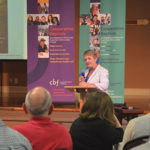Posted: 7/28/06
| The Bivocational and Smaller Church Ministers and Spouses Statewide Conference met for worship, seminars and networking at the University of Mary Hardin-Baylor campus. (Photos by Eric Guel) |
Bivocational Ministers Conference marks 20 years
By Eric Guel
Texas Baptist Communications
BELTON—Leaders of Texas Baptist bivocational and small churches didn’t let distance or cost keep them from their annual get-together this summer.
For the 20th consecutive year, the University of Mary Hardin-Baylor hosted them for the annual Bivocational and Smaller Church Ministers and Spouses Statewide Conference.
The gathering attracted 275 participants. In addition to attending an assortment of seminars, participants fellowshipped and networked with Baptists from around the state.
 |
| David Keith of Carlton Baptist Church leads a seminar at the conference. |
Bob Ray, the Baptist General Convention of Texas’ bivocational/smaller-church ministry director, noted the meeting drew participants from virtually all corners of the state.
“Even with the high price of gasoline, we have had a large number of pastors who have come a great distance,” he said. “They’ve come from all the way down from Brownsville to as far out as Fort Davis. We’re hopeful that the conference is meeting a really big need in their lives.”
The conference also attracted many first-time participants.
“I would estimate that 40 percent of the folks who are here are here for the first time,” Ray said. “That’s a real encouragement that we’re still reaching out to a lot of churches who have not had the opportunity to come.”
Tommy Bobo of CenterPointe Church in Red Oak said the weekend’s seminars and fellowship met his personal needs.
“It’s been a blessing. I surrendered to the ministry two years ago, and it’s a real source of encouragement to see pastors from around the state getting to know each other and fellowshipping together,” he said.
True to its annual tradition, the association handed out a pair of $1,000 scholarships to ministry students with an enthusiasm for bivocational and/or smaller-church work. B.H. Carroll Theological Institute student Grover Pinson, pastor of Windsor Park Baptist Church in Corpus Christi, received a scholarship, along with Truett Theological Seminary student Joseph Palermo of First Baptist Church in Killeen.
 |
| Tommy Bobo of Center Point Community Church in Red Oak participates in a seminar. |
Tom Echols, the association’s treasurer, said the scholarships are made possible by bivocational and smaller church members and leaders. “We’re here to help people,” he said. “That’s the kind of people we are.”
Randy Gressett, pastor of First Baptist Church in Seminole, led a seminar titled “The Truth Hurts.”
“This seminar is about how so many different things in the world are competing against God for our youth,” he said. “Baptist leaders need to be out there with a powerful message.”
Popular music, the mainstream media and the movie industry are malignant forces vying for young peoples’ attention, Gressett said.
“Is the message our kids get from the music industry, television and movies always the message we want them to hear?” he asked.
David Keith, pastor of Carlton Baptist in Carlton, taught a two-part session on time management—a key issue in bivocational ministry because so many factors contend for a leader’s attention, he said.
In a broader sense, even a minister’s particular nonministry vocation can influence his extended time practices, he added.
“You can broadly categorize our bivocational pastors’ vocations into two groups—individuals who are skilled at a trade and those in salaried professions,” he said.
Both types of workers face unique time challenges that relate directly to their ministries, he observed.
“Skilled workers have less flexibility. Usually, they’re the ones punching a clock,” he said. “However, their jobs are much more portable and much more suited to church planting. They can minister in a lot of different areas.”
Ministers working in salaried positions or self-employed workers often have more flexibility with time, but they’re not as mobile as those in skilled positions, Keith said.
“Those bivocational pastors are a lot more limited in where they can go. They’re not as mobile as skilled, trade employees,” said Keith, who is a bivocational pastor and educator.
“They do, though, allow smaller churches to have some continuity and length of tenure with their pastor. In my case, I’ve been at my church for 22 years.”
















We seek to connect God’s story and God’s people around the world. To learn more about God’s story, click here.
Send comments and feedback to Eric Black, our editor. For comments to be published, please specify “letter to the editor.” Maximum length for publication is 300 words.